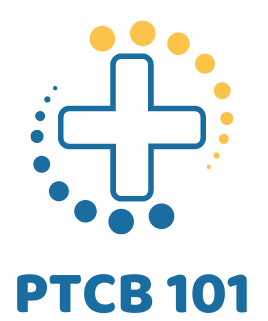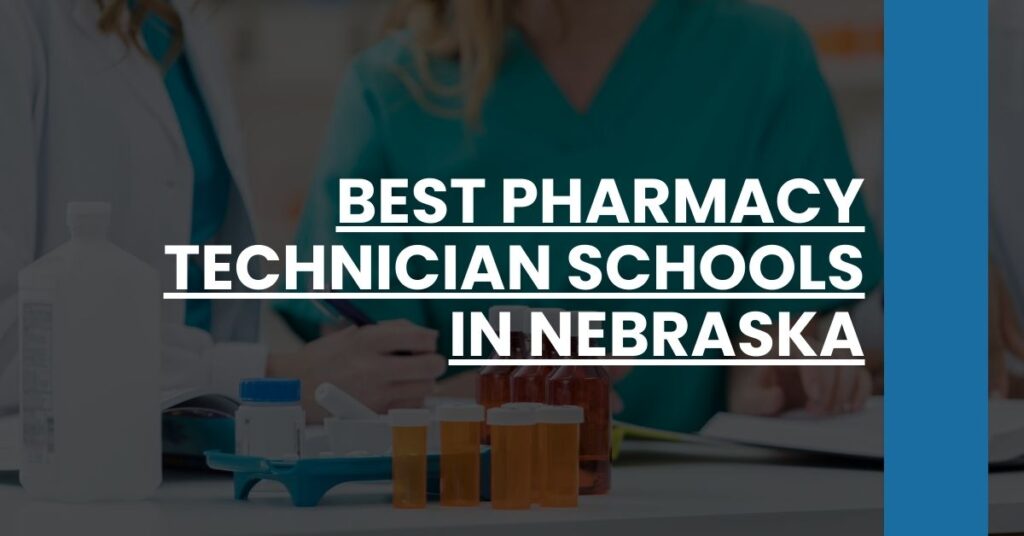Looking for programs in a specific city? Check out our lists of Pharmacy Technician Schools in Omaha and Lincoln.
Choosing the right school for your pharmacy technician training is crucial, and we’ve noticed a growing interest in finding the best pharmacy technician schools in Nebraska. It’s understandable since a career as a pharmacy technician offers stability and a decent salary. With Nebraska’s demand for skilled technicians on the rise, you might be wondering how to navigate this path.
To help you make an informed decision, our team has put together a comprehensive guide that covers:
- A list of the best pharmacy technician schools in Nebraska, including their unique features
- Details on what criteria to consider when selecting a school
- Insights on financial aid and job placement services available
Your future in pharmacy starts here.
- Why Pursue a Career as a Pharmacy Technician in Nebraska?
- What Are the Requirements to Become a Pharmacy Technician in Nebraska?
- How to Choose the Right Pharmacy Technician School
- Top Accredited Pharmacy Technician Schools in Nebraska
- Online Pharmacy Technician Programs vs. On-Campus Programs
- What to Expect in Pharmacy Technician Training Programs
- Job Placement and Career Services
- Financial Aid and Scholarships for Pharmacy Technician Students
- Frequently Asked Questions About Pharmacy Technician Training
- Looking for Pharmacy Technician School Information On States Bordering Nebraska?
- Conclusion
Why Pursue a Career as a Pharmacy Technician in Nebraska?
Growing Demand for Pharmacy Technicians
In Nebraska, the healthcare industry is thriving. According to data from CareerExplorer, roughly 3,410 pharmacy technicians currently work in the state, with the profession projected to grow by 12.25% over the next decade. This increase reflects a robust demand for pharmacy technicians, driven by the state’s expanding healthcare needs and aging population.
Competitive Salaries and Job Stability
As a pharmacy technician in Nebraska, you can earn a competitive salary. The average annual salary for pharmacy technicians in the state is around $40,664, while entry-level positions typically start at approximately $34,125 per year. These figures indicate that pharmacy technicians earn a decent wage compared to other entry-level healthcare positions.
Nebraska’s job market for pharmacy technicians is stable. Major employers like Walgreens, CVS Health, and Bryan Health are continually searching for skilled technicians. This steady demand ensures job security for those entering the field.
Meaningful Career Opportunities
Becoming a pharmacy technician allows you to play a critical role in patient care, improving lives by managing medication therapy and ensuring that prescriptions are filled accurately. This career offers satisfaction from knowing your work directly impacts patient health and well-being.
What Are the Requirements to Become a Pharmacy Technician in Nebraska?
Education and Certification Requirements
In Nebraska, aspiring pharmacy technicians must meet specific education and certification standards to practice.
- Educational Background: You need a high school diploma or GED to qualify.
- Age Requirement: Candidates must be at least 18 years old.
- Legal Requisites: You must register with the Nebraska Department of Health and Human Services, which involves a $25 fee, proof of U.S. citizenship or lawful presence, and a clear criminal background check.
Certification and Maintaining Licensure
Nebraska requires pharmacy technicians to achieve certification from a board-approved state or national certifying body. Certification processes typically involve passing an exam like the PTCB (Pharmacy Technician Certification Board) or the NHA (National Healthcareer Association).
Once certified, maintaining your certification involves continuing education and recurring registration with the state. Ensuring you stay up to date with these requirements guarantees that you remain qualified to practice.
Criminal Background Check
The state mandates a criminal background check to confirm that applicants have no felonies or drug-related misdemeanors. This process ensures that only qualified and trustworthy individuals enter the profession, maintaining high standards within the healthcare industry.
How to Choose the Right Pharmacy Technician School
Accreditation
One of the most critical factors when selecting a pharmacy technician school is accreditation. Schools accredited by the American Society of Health-System Pharmacists (ASHP) adhere to stringent education standards. Choosing an accredited program ensures you receive high-quality training recognized nationally.
Program Length and Structure
Pharmacy technician programs can range from nine months to two years, depending on whether you pursue a diploma, certificate, or associate degree. Consider your career goals and how quickly you want to enter the workforce when deciding between these options.
Costs and Financial Aid
The cost of pharmacy technician programs can vary significantly. Some exclusive programs might require a higher investment.
- Federal and State Financial Aid: You can apply for these by completing the FAFSA form.
- Scholarships: Organizations like the American Association of Pharmacy Technicians offer scholarships specifically for pharmacy technician students.
Job Placement Rates and Career Services
The school’s job placement rate can indicate how effectively it helps students transition to employment. Look for programs that offer robust career services, including job fairs, résumé assistance, and interview preparation. These services can significantly enhance your job prospects post-graduation.
Top Accredited Pharmacy Technician Schools in Nebraska
Fulton Homes Education Center
Located in Omaha, Fulton Homes Education Center offers a comprehensive Pharmacy Technician course as part of their healthcare programs. The school’s program combines classroom instruction with hands-on training, preparing students for certification and employment. Their current license is valid until 2025.
Goodwill Training Center
Goodwill Training Center in Omaha provides a well-rounded pharmacy technician training course. Their curriculum covers essential topics such as medication therapy management and pharmaceutical calculations, ensuring students are well-prepared for their roles. Their license remains valid until 2024, indicating a commitment to maintaining educational standards.
Prestige Health Education Center LLC
This Omaha-based institution offers a pharmacy technician program alongside other healthcare courses. Prestige Health Education Center focuses on practical skills and prepares students through extensive hands-on training. This approach ensures graduates are job-ready and capable of excelling in their careers.
Online Pharmacy Technician Programs vs. On-Campus Programs
Flexibility and Convenience
Online pharmacy technician programs, such as those offered by Penn Foster, provide flexibility ideal for working adults or those with busy schedules. Penn Foster’s program, for example, costs around $674, making it an affordable option for many.
On-campus programs offer structured schedules that may better suit learners who thrive under direct supervision and hands-on learning environments. Programs like those offered by the American Career College, which cost approximately $11,495, include essential hands-on lab sessions necessary for practical skills development.
Comparative Costs
While online programs generally offer lower tuition fees, on-campus programs may have higher costs due to the inclusion of hands-on training facilities and resources. Evaluating whether the additional expense justifies the potential value gained from direct lab experience is crucial.
Accreditation and Certification Preparation
Both online and on-campus programs should be accredited by reputable bodies such as the ASHP. Accreditation ensures the program meets established standards and adequately prepares students for certification exams and their subsequent careers.
What to Expect in Pharmacy Technician Training Programs
Coursework and Theory
When you enroll in a pharmacy technician training program, you will cover essential topics that prepare you for your future career. The curriculum typically includes:
- Medication Therapy Management: Understand how to manage and organize medication regimens for patients effectively.
- Pharmaceutical Calculations: Learn to calculate correct medication dosages, which is crucial for patient safety.
- Pharmacy Law and Ethics: Know the legal and ethical guidelines governing the pharmaceutical industry.
These courses offer the theoretical foundation that you need to perform well in a pharmacy setting.
Practical Training Components
Practical skills are just as important as theory. Pharmacy technician programs include hands-on training to make you job-ready. Practical components generally cover:
- Prescription Preparation: Gain proficiency in preparing and dispensing medications.
- Inventory Management: Learn how to manage medication stock, including ordering and restocking.
- Customer Service Skills: Develop communication skills to interact effectively with patients and healthcare professionals.
Programs often require externships, giving you the opportunity to work in real pharmacy settings. This experiential learning is invaluable for understanding the day-to-day responsibilities of a pharmacy technician.
Accreditation and Standards
Accreditation bodies such as the American Society of Health-System Pharmacists (ASHP) set guidelines for pharmacy technician programs. These guidelines ensure that the curriculum covers all essential areas, such as:
- Comprehensive Coursework: Covering the broad range of topics needed for pharmacy technician certification.
- Experiential Learning: Including hands-on labs and externships that prepare you for real-world scenarios.
Enrolling in an accredited program ensures you receive training that meets industry standards.
Job Placement and Career Services
Job Placement Rates
It’s essential to consider a school’s job placement rate when choosing a pharmacy technician program. Schools with high placement rates generally offer strong support to help you transition from student to professional. For example:
- Jethro Healthcare School: Boasts a 90% job placement rate within six months of graduation.
- Ross Education: Provides job fairs and networking opportunities to connect you with potential employers.
Career Support Services
Many schools offer extensive career services to help you secure employment post-graduation. These services might include:
- Résumé Assistance: Helping you craft a compelling résumé that stands out to employers.
- Interview Preparation: Providing mock interviews and tips to boost your confidence.
- Networking Opportunities: Connecting you with industry professionals through job fairs and alumni networks.
Such services can significantly enhance your job prospects and ease your transition into the workforce.
Financial Aid and Scholarships for Pharmacy Technician Students
Federal and State Financial Aid
To make your education more affordable, you can apply for federal and state financial aid. Completing the FAFSA form is the first step in determining your eligibility for various aid options including:
- Grants: Money you don’t have to repay.
- Loans: Funds you will need to repay, usually with interest.
Scholarships and Financial Support
Scholarships specifically for pharmacy technician students are also available. Organizations like the American Association of Pharmacy Technicians offer annual scholarships that can help cover tuition costs.
- Stepful Scholarships: Providing up to $2,500 for eligible pharmacy technician students.
- Flexible Payment Plans: Allowing you to pay tuition in installments, making it easier to manage your finances.
These financial aid options can make your educational journey more affordable and less stressful.
Frequently Asked Questions About Pharmacy Technician Training
What Are the Certification Details?
Pharmacy technician certification is an essential step in your career. Nebraska mandates certification through a recognized body like the PTCB (Pharmacy Technician Certification Board) or the NHA (National Healthcareer Association). Certification generally involves passing an exam that tests your knowledge and skills in pharmacy practices.
Is the Certification Process Difficult?
While challenging, certification is generally considered more accessible than other healthcare-related certifications, such as EMT certifications. Preparation through accredited training programs significantly boosts your chances of passing the certification exam.
Continuing Education Requirements
Once certified, you must complete continuing education requirements to maintain your registration. This ensures you stay updated on the latest industry standards and practices. Most certifications need renewal every two years.
What Kind of Support Will I Get During My Training?
Most accredited programs offer robust support services, including tutoring and mentoring. This support helps ensure you succeed academically and are well-prepared for the certification exam.
Looking for more Pharmacy Technician information? Check out our PTCB practice test, find pharmacy technician programs near you, learn how to become a pharmacy technician, explore options for online pharmacy technician programs, and see information about the pharmacy technician license.
Looking for Pharmacy Technician School Information On States Bordering Nebraska?
In addition to Nebraska, we suggest looking for schools in nearby states.
- Best Pharmacy Technician Schools In South Dakota
- Best Pharmacy Technician Schools In Iowa
- Best Pharmacy Technician Schools In Missouri
- Best Pharmacy Technician Schools In Kansas
- Best Pharmacy Technician Schools In Colorado
Conclusion
Choosing the right pharmacy technician school in Nebraska is your first step towards a rewarding career in healthcare. With the right training, certification, and support, you can look forward to a stable and meaningful profession. Ready to start your journey? Explore the options and take the next step to secure your future as a pharmacy technician.

